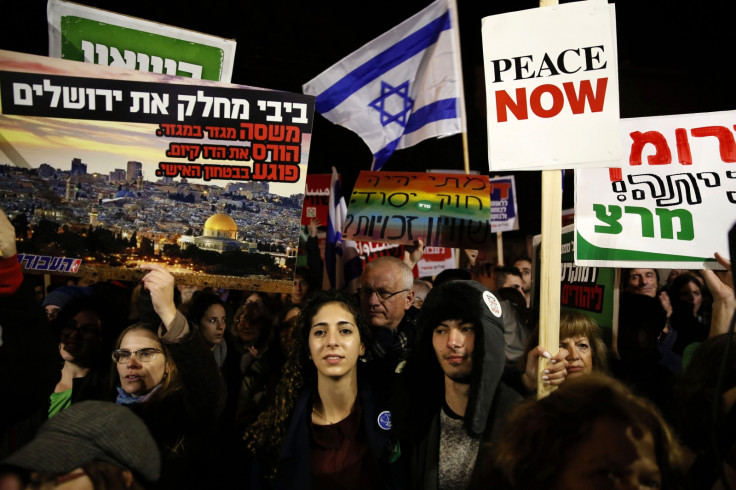Hundreds Protest Against Israel Jewish Nation-State Bill as Netanyahu Threatens New Elections
Controversial Jewish nation-state law may take down coalition government

Hundreds of Israelis have taken part in a protest against the controversial Jewish nation-state bill in front of Prime Minister Benjamin Netanyahu's Jerusalem residence, as the proposed law threatens to take down the fragile governing coalition
The bill has been described as one of the most divisive and complex laws in the country's history.
Members of the left-wing Meretz party rallied the demonstrators around universal democratic values, which the organisers' say are at risk if the bill is approved in name of nationalism.
"Democracy without equality is democracy for Jews alone, a democracy that wants to kick out Israel's Arab citizens," Meretz chairwoman Zahava Gal-On, who is also member of the Knesset, said.
Netanyahu is expected to deliver a final version of the bill in the next few days.
"The criticism leveled against the state of Israel is only directed against your occupation policy, and if you're so displeased by the Declaration of Independence, there's no reason to try and rewrite it with despicable legislation. You can just pack up and leave, and go find a state with different principles," she said.
The reference is with one of the main criticism over the bill, which defines Israel as the "nation-state of the Jewish people" and attempts at resolving the binomial drift between the country's Jewish identity and democratic nature.
Centrists in Netanyahu's coalition, Arab-Israelis and left-wingers argue that legislation is not needed as the state's Jewishness is enshrined in the 1948 Declaration of Independence.
The proposed bill says that only Jewish people will have national rights – including the right to self-determination, to a flag, an anthem and free immigration. It absolves the state from its responsibility to protect collective rights of non-Jewish communities, such as Israeli-Arabs, which account for the 20% of Israel's population.
The key distinction that emerges is between national rights, which would be exclusive to the Jewish people, and personal rights which would be upheld for all.
Arab Israelis complained that bill would leave them as second-class citizens
Gal-On claimed that the state of Israel "is becoming more violent, less democratic, more messianic, closeted and paranoid", according to Haaretz.
The protest came as Netanyahu hinted at the possibility of new elections only 20 months after the formation of the current government.
Two centrist parties in the coalition said they would not support the bill and Justice Minister Tzipi Livni threatened to resign.
The prime minister accused Finance Minister Yair Lapid of playing "petty politics".
"Recently, hardly a day passes without us running into diktats or threats of resignation, or ultimatums and such, as ministers attack the government and its prime minister," he told his cabinet meeting, according to the New York Times. "I hope that we will be able to return to proper conduct. This is what the public expects of us because only thus is it possible to run the country, and if not, we will draw conclusions."
© Copyright IBTimes 2025. All rights reserved.




















